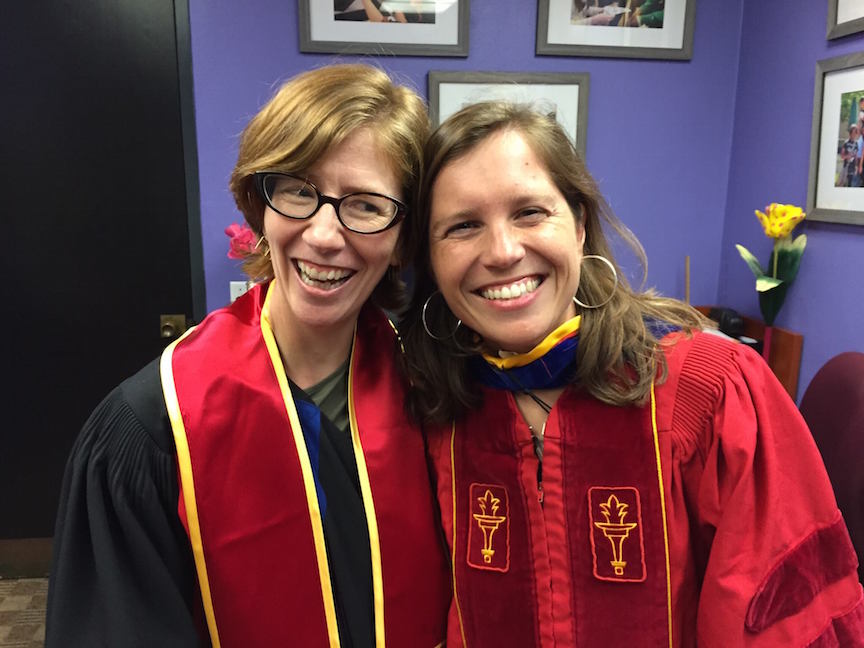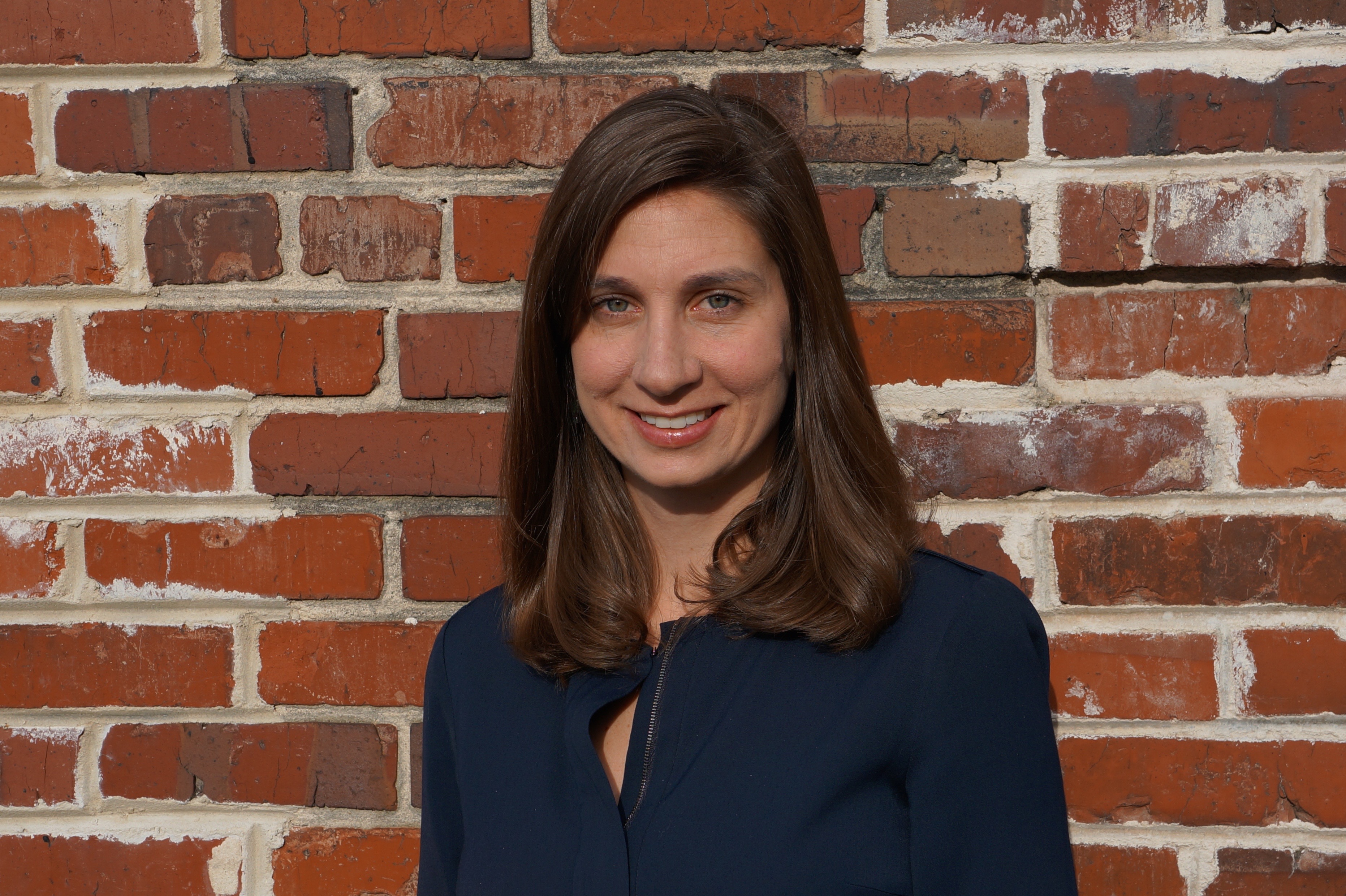Holly Kosiewicz is Director of Policy Development at the Texas Higher Education Coordinating Board. She served as a Peace Corps volunteer in Jordan and El Salvador and has worked on research teams in Colombia, Peru, and the United States. Her work has been included and published in several book projects as well as The Journal of Higher Education, The Journal of Economic Psychology, and Education Week. Holly earned her Master’s at Brandeis University (2007) and completed her PhD at the University of Southern California (2015).
HARRIS: What were your immediate plans after finishing undergrad and did they work out the way you imagined they would?
HOLLY: I graduated from UT Austin in 2002, and my intent was to do international development work. I’m a first-generation American, and my Polish parents instilled in me the importance of understanding different cultures. So, after UT, I joined the Peace Corps and worked in Jordan. Unfortunately, we were evacuated after six months of service. That sent me back to the States for about half a year. After that I returned to the Peace Corps in El Salvador but I realized it wasn’t really a good fit; nevertheless I still wanted to do something related to international development work. So, afterwards, I decided to get a Master’s in International Development from Brandeis University. As a student there, I became a research assistant on a project that was examining the well-being of a Bolivian indigenous group: the Tsimane’. That experience is what sparked my interest in doing research.
After I graduated with my Master’s degree, I got a job working as a research assistant at the Universidad de los Andes in Bogota, Colombia. There, I worked on a number of projects, but the project that most interested me was one that investigated the impacts of a financial aid program intended to help lower-income students attend and succeed in college. What I liked about that project was that I was able to work with economists and psychologists who were studying the behavioral dimensions of student aid. I worked at Los Andes for a year before returning to the States to start paying off my student loans. When I returned, I began my work in DC as a researcher for an education newspaper called Education Week. If you’re interested in education, or K-12, I would recommend looking into it and reading its articles.
After working there for two years, I enrolled in the education policy Ph.D. program at the University of Southern California. USC gave me the best opportunity to do my own research and gave me the best financial support. While there, I studied developmental education in community colleges. To give you some context, developmental education is largely used by community colleges to help underprepared students succeed at the college level. Some people call it “remedial coursework.” And there’s been a lot of debate about the effectiveness of developmental education. I did a wide range of research—I do mixed methods research, which means it involves both quantitative and qualitative approaches—trying to test the effectiveness of different assessment instruments to determine which ones can adequately assess if a student is prepared for college or not.
In my last year of school, I was laboring on whether I should go to academia or whether I should enter the government. It was a hard decision. Deep down, I really wanted to conduct research that could make a meaningful impact on the education that students receive, and I wanted to work directly with state and local policy makers.
So instead of taking a job in academia, I decided to take a job as Director of Policy Development at the Texas Higher Education Coordinating Board. Because the work I’m doing has a clear impact on state higher education policy, I think it is the right place to be, at least for now. But only time will tell if I transition to a research organization or try being an academic later.
HARRIS: You’re back in Texas, right? Did a longing to be home bring you back?
HOLLY: Yeah, for sure. I wanted to be closer to my parents, especially as they get older. My husband and I have a family here and want to make sure our kids have a close relationship with our relatives.
HARRIS: Can you describe for me what you do during a typical day at work?
HOLLY: Well, my work really ebbs and flows. I don’t really have a typical day, but I can tell you what I do. My official title is Director of Policy Development at the Texas Higher Education Coordinating Board, and I work in a relatively new division at the agency called Innovation and Policy Development. And the short of it is: we’re considered a think tank within the state agency, that supports and conducts research that has the potential to inform higher education policy and practice in the state. For the past year, I have been developing relationships with external researchers—these might be researchers in academic institutions, like Dickinson, or in think tanks—to work on studies that answer the big questions that state policy makers have around higher education.
For example, one of the things I’m currently working on is dual-credit education. Dual-credit education is a process by which a high school student can simultaneously earn high school and college credit from a single course. In Texas, participation in dual-credit education has been expanding rapidly for the last 15 years. But recently, due to new legislation, it’s also seen a significant increase in the percent of 14- and 15-year-olds participating in it. As a result of these shifts, state and local policymakers are raising questions about whether dual-credit education is being effectively scaled. Are students academically prepared to succeed in dual-credit courses, which are college-level courses? Are the academic standards used to teach dual-credit courses the same as those used to teach regular college courses? What are the costs of delivering dual-credit education? And very broadly, how are high school students benefitting from dual-credit education? These are some questions that the Coordinating Board, in collaboration with the RAND Corporation, is trying to answer, and we hope that these answers can help state legislators and policymakers decide what kinds of reform should take place.
HARRIS: What do you think are some of the biggest challenges to developing and implementing policies in higher education?
HOLLY: I think one big challenge is how to go about improving education policy and practice when working with very limited resources. In other words, where can you introduce reforms that generate the largest gains for the least amount of money? That question is always at the forefront of policymaking at all levels of government.
Another challenge is the political pressure that policymakers encounter continuously to get things done. Many times, the pressure to get things done quickly runs counter to the long time it takes research to inform what policy should look like. Research is typically very methodical and it’s slow to produce results. Policymakers, however, need to make decisions quickly, and so they are not going to wait for research that takes five years to complete. The challenge is thus designing research that can produce results relatively quickly while meaningfully informing the decisions that policymakers need to make.
Another challenge is that there are a lot of stakeholders involved, and each of them has its own interests and concerns. It’s sometimes difficult to understand what all of these interests and concerns are, not to mention determining how to balance them in such a way that everyone benefits. Not only students, for instance, but also teachers and faculty, advisors and administrators.
HARRIS: You’ve worked in different educational systems and in several capacities related to education: development projects, policy research abroad. How have these experiences informed the work you do now?
HOLLY: Well, I’ve always believed that education can make society more equal. And that belief has shaped the work that I have done since I’ve graduated from college. I’ve always wanted to ensure that my work could really improve education quality, particularly for the underserved. If I wasn’t doing that—if my work was helping maintain the status quo, for instance—that would make me feel very uncomfortable.
HARRIS: Some people might cast or imagine policy research as being a separate project from what could be called “on the ground” work, or work that interacts directly with the people affected by policy.
HOLLY: I don’t think policy research has to be detached at all from the people you are trying to affect. There are all different types of research. There is research that uses administrative records from state government agencies or federal government agencies. But there is also policy work or policy research where the researcher engages directly with students, with teachers, with community organizers to really get a better grasp of what is happening in the trenches and to give voice to those who have been silenced by more dominant groups. I think the experiences of people who deliver education or experience education is extremely valuable, especially when you’re trying to contextualize, for example, quantitative findings. And the only real way you can get at that is by actually talking to the people who are directly involved in overseeing and delivering education.
HARRIS: What advice do you have for someone trying to determine the best way to have an impact on the educational systems that surround them?
HOLLY: I took some time off after earning an undergraduate degree—I didn’t go straight into my PhD because I think it is really important to figure out where your passion lies. And I think one way of doing that is working in the trenches and really trying to figure out what are the challenges that students are facing and what are the challenges that teachers are facing. I think those experiences can really help you figure out what you are interested in and what you like to do. For example, I was a teacher in the Peace Corps and I discovered that I wasn’t particularly good at it. But that experience also helped me to better understand that there are so many external factors, like nutrition and outside demands, that can impact if a child learns and performs well. I saw that with my own eyes, and I don’t think I would have learned about that sitting behind a computer screen or reading a report, you know? Or at least, I wouldn’t have learned it so profoundly.
So I would recommend to anyone who is interested in making an impact on education policy to work side-by-side with educators, parents, students and educational organizations. Get to really know the challenges that they are facing before trying to make change. Once you get a good grasp of what those challenges are, the way you approach education policy research will be more thoughtful, and probably will gain more respect.


Recent Comments